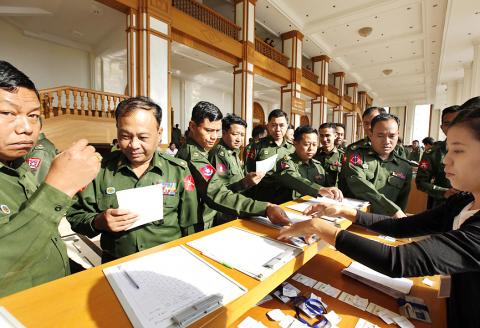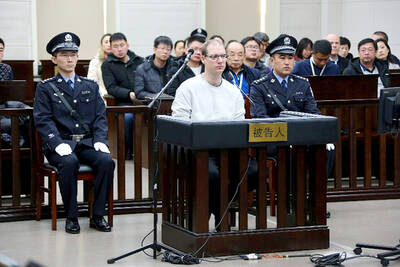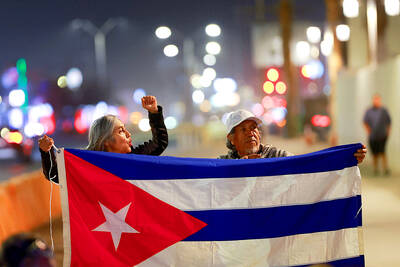In a modest dormitory in Myanmar’s capital, Naypyidaw, novice Burmese Member of Parliament (MP) Tin Thit recites a poem he has penned called No Retreat, steeling himself to enter Myanmar’s parliament carrying the dreams of a nation left traumatized by army rule.
A poet, editor, activist — and now newly elected MP — he is among hundreds of political newcomers poised to take their seats today in the nation’s most democratic legislature in generations, following the huge landslide win by Aung San Suu Kyi’s National League for Democracy (NLD) in November last year.
“This is our era,” the newly minted NLD lawmaker said on Saturday as he prepared for a last-ditch round of parliamentary training organized by his party, brushing off concerns about his and his colleagues’ lack of experience.

Photo: AP
“This is our responsibility. We will just do the job we have to do,” he said.
The new parliament marks a momentous political shift for a nation that was held in the choke hold of oppressive junta rule for decades.
Many of the NLD MPs have served prison time in Myanmar’s long struggle for democratic change. They are a diverse bunch, counting singers, lawyers and businessmen among their ranks.
However, few have any experience of the cut and thrust of Myanmar’s complex parliamentary process.
They must show the nation’s 51 million people that they can deliver the “change” that was virtually the sole message of Aung San Suu Kyi’s triumphant election bid.
That is unlikely to be easy.
While the junta handed power to a quasi-civilian reformist government in 2011, the Southeast Asian nation remains blighted by poverty and corruption. Junta-era neglect has left a legacy of ravaged education, healthcare, infrastructure and a creaking bureaucracy.
Ethnic minority divisions have also torn deep fractures across the nation and civil wars continue to ravage border areas, fought by a military that has ensured it is to retain huge political and economic powers under the new government.
“Our region is another world,” said Cing Ngaih Mang, a newly elected MP for a small ethnic minority party from western Chin State, marveling at the grandeur of Myanmar’s junta-built capital.
“The difference in development is like comparing earth and sky,” she said, adding that she had been watching parliamentary TV to brush up on protocol.
Tin Thit never aspired to be a politician, but he managed to topple former Burmese Minister of Defense Wai Lwin in a vote in November last year, winning a lower house seat in the military heartland of Naypyidaw.
About 390 NLD MPs are due to take their seats in the national parliament today, turning the tables on the army-backed party that dominated the legislature alongside a bloc of unelected military MPs for the past five years.
While the NLD-led parliament is likely to be seen as essentially a rubber stamp for Aung San Suu Kyi’s government, complex political manoeuvring awaits in the coming days.
The parliament is to shortly nominate a new president to replace incumbent Burmese President Thein Sein, a former general, in late March.
Aung San Suu Kyi is barred from the position by a military-scripted constitution, because she married and had children with a foreigner.
She has vowed to rule “above” the next leader, a move that is likely to put her at loggerheads with the army, which holds an effective veto on charter change because it retains a quarter of seats in the legislature.
Only about two dozen NLD MPs entering parliament today, including Aung San Suu Kyi, have prior legislative experience, meaning the party has few veterans to show new lawmakers the ropes.
To combat this, the party has been running workshops in recent weeks, while new MPs flocked to Naypyidaw to watch their predecessors in the last days of the previous parliament, which ended on Friday last week.
At a series of squat regimented housing blocks where shabby one-story dorms cost US$4 a day, new MPs were moving in.
“We can endure it. We came here for the country,” said one NLD lawmaker, who asked to remain anonymous, adding that many had “served time in prison” and could get by without luxury.
Tin Thit said the experience was like a reunion, with former cellmates, school friends and other acquaintances gathered together in the junta-built capital.
He served seven years in jail for poems deemed critical of the state.
However, the 49-year-old is also eager to put the past behind him, in a sentiment that reflects the extraordinary scenes of camaraderie in the parliament in recent days, as the army elite sought to hand over power with grace — even throwing a party to mark the occasion.
“We need to move forward,” he said.

China’s military news agency yesterday warned that Japanese militarism is infiltrating society through series such as Pokemon and Detective Conan, after recent controversies involving events at sensitive sites. In recent days, anime conventions throughout China have reportedly banned participants from dressing as characters from Pokemon or Detective Conan and prohibited sales of related products. China Military Online yesterday posted an article titled “Their schemes — beware the infiltration of Japanese militarism in culture and sports.” The article referenced recent controversies around the popular anime series Pokemon, Detective Conan and My Hero Academia, saying that “the evil influence of Japanese militarism lives on in

DIPLOMATIC THAW: The Canadian prime minister’s China visit and improved Beijing-Ottawa ties raised lawyer Zhang Dongshuo’s hopes for a positive outcome in the retrial China has overturned the death sentence of Canadian Robert Schellenberg, a Canadian official said on Friday, in a possible sign of a diplomatic thaw as Canadian Prime Minister Mark Carney seeks to boost trade ties with Beijing. Schellenberg’s lawyer, Zhang Dongshuo (張東碩), yesterday confirmed China’s Supreme People’s Court struck down the sentence. Schellenberg was detained on drug charges in 2014 before China-Canada ties nosedived following the 2018 arrest in Vancouver of Huawei chief financial officer Meng Wanzhou (孟晚舟). That arrest infuriated Beijing, which detained two Canadians — Michael Spavor and Michael Kovrig — on espionage charges that Ottawa condemned as retaliatory. In January

A sign hanging from a rusty ice-green shipping container installed by Thai forces on what they say is the border with Cambodia reads: “Cambodian citizens are strictly prohibited from entering this area.” On opposite sides of the makeshift barricade, fronted by coils of barbed wire, Cambodians lamented their lost homes and livelihoods as Thailand’s military showed off its gains. Thai forces took control of several patches of disputed land along the border during fighting last year, which could amount to several square kilometers in total. Cambodian Kim Ren said her house in Chouk Chey used to stand on what is now the Thai

NEW RULES: There would be fewer school days, four-day workweeks, and a reduction in transportation services as the country battles a crisis exacerbated by US pressure The Cuban government on Friday announced emergency measures to address a crippling energy crisis worsened by US sanctions, including the adoption of a four-day work week for state-owned companies and fuel sale restrictions. Cuban Deputy Prime Minister Oscar Perez-Oliva Fraga blamed Washington for the crisis, telling Cuban television the government would “implement a series of decisions, first and foremost to guarantee the vitality of our country and essential services, without giving up on development.” “Fuel will be used to protect essential services for the population and indispensable economic activities,” he said. Among the new measures are the reduction of the working week in